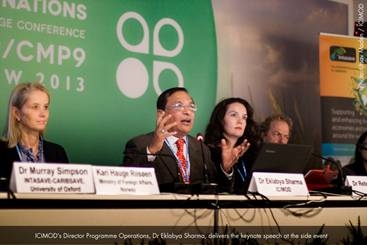COP19: Call to tackle climate change challenges

Warsaw, Poland : Vulnerable communities in developing countries, mountain nations, and small island developing states (SIDS), need global support and knowledge to adapt to the rapid and unpredictable changes.
This was the central theme of the side event ‘Adaptation without Borders: Building Cooperation for Resilient Regions’ organized jointly by INTASAVE-CARIBSAVE, the International Centre for Integrated Mountain Development (ICIMOD), and Oxford University’s Environment Change Institute (ECI) in collaboration with GRID-Arendal and other partner institutions at the UNFCCC COP19 in Warsaw, Poland, on 14 November 2013.
The event underpinned the importance of fostering cooperation among countries and regions to address adaptation to climate change and sustainable development in developing countries, mountainous nations, and SIDS. Over 100 participants of COP 19, including policymakers and negotiators, from all the regions, and particularly from the coastal and mountainous regions, attended the event.
The event highlighted the vulnerability of mountains and of those who depend on them. It reminded the participants the value of mountains as ‘water towers’ of the world and global reservoirs of biodiversity. The high-level panel called on COP19 delegates and global development partners to protect vital mountain ecosystems and to support adaptation programmes in the mountains for improved livelihoods and sustainability, and to create incentives to enhance the benefits mountain people derive from conserving their ecosystems.
The event showcased a preview of an upcoming publication on food security ‘The Last Straw’ that highlights the additional burden of climate change on food security in the Hindu Kush Himalayan (HKH) region. A video teaser titled ‘Scaling Mountains, Gaining Heights’ presented concerns from women environmental leaders on gendered differences to climate change adaptation.
Delivering the keynote address at the event, ICIMOD’s Director Programme Operations, Dr Eklabya Sharma, said that more than half of the humanity directly or indirectly depends on the mountains and well-designed transboundary cooperation approaches are essential to ensure the sustainability of ecosystem services that are received from the mountains. “And women are central to any adaptation approach as they are at the forefront to manage resources in the mountains, particularly with increased migration of men to urban areas,” he said.
Dr Eklabya Sharma urged countries in the South, particularly those in the HKH region, to share resources and knowledge to adapt to the challenge of climate change and other drivers of change.
Dr Rebecca Nadin, Director, Adapting to Climate Change in China, pointed out that adaptation without borders was not limited to geographic or political borders. While these are essential, the complex nature of adaptation policy and planning means other borders between sectors, technical disciplines, and even those within the country as national to sub-national levels must be crossed.
The Chief Technical Officer of INTASAVE-CARIBSAVE, Dr Owen Day, outlined the importance of identifying and working with community agents of change. He said ecosystem-based adaptation might be an adequate solution for the coastal regions.
Presentations on collaborative work carried out by ICIMOD, GRID-Arendal, and CICERO in Himalayan Climate Change Adaptation Programme (HICAP) which is supported by the Governments of Norway and Sweden highlighted the importance of strategic partnership-based activities, especially in food security and gender equality, to raise awareness about climate change issues in the mountains.
In his closing remark, the CEO of INTASAVE-CARIBSAVE, Dr. Murray Simpson, who also chaired the panel discussion, highlighted the International South-South Initiative for Policy, Legislation, and Practice that stressed on the common themes of gender, crossing sectoral and national boundaries and working through existing community structures as meaningful action for adaptation.
For more information please contact:
Dr Murray C. Simpson, Oxford University Centre for the Environment, Chief Executive Officer; The INTASAVE Partnership and CARIBSAVE, Partner@intasave-caribsave.org














